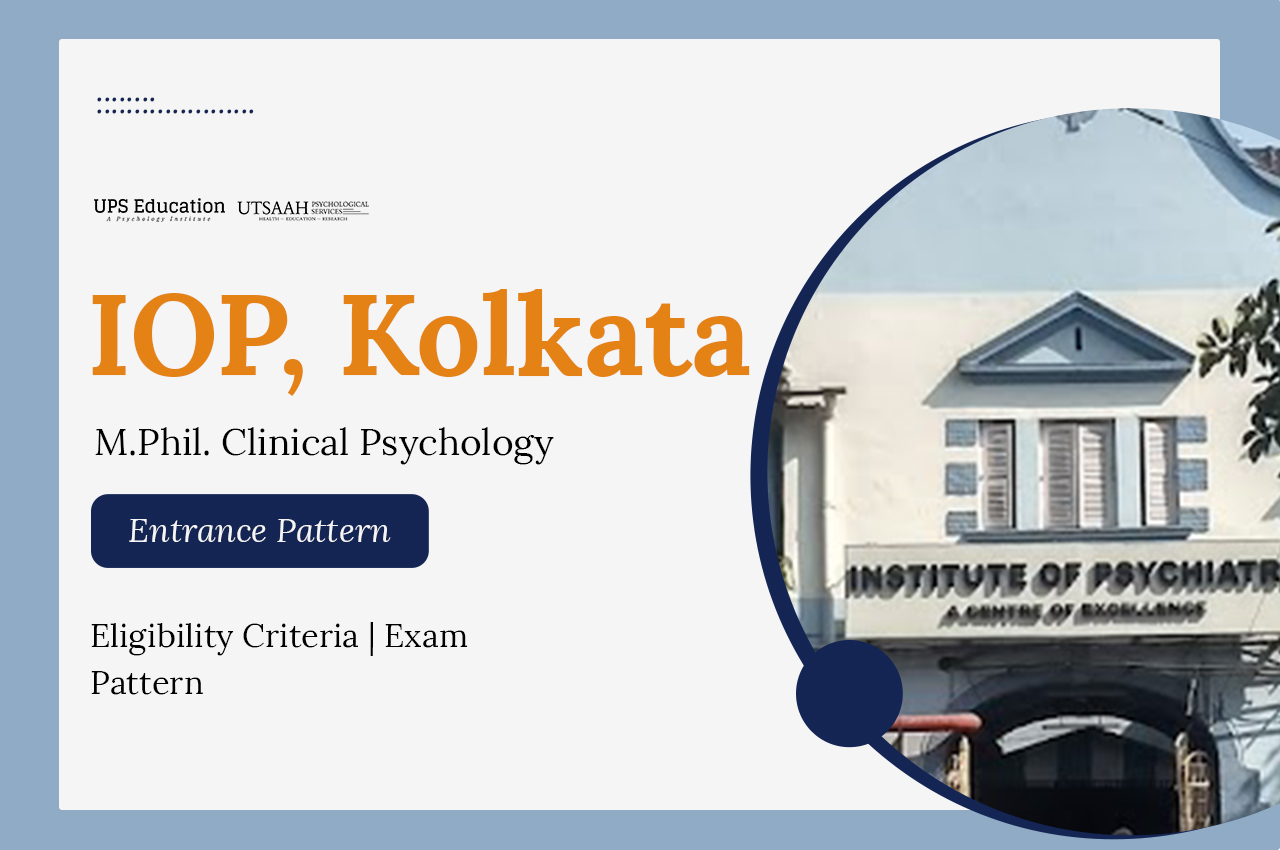The Institute of Psychiatry (IOP), Kolkata, is one of the oldest psychiatric hospitals in India. This government Mental Health care organization came into existence in the year 1817 in West Bengal. The institute offers Post Graduate courses, as well as psychiatric services. These PG courses cover the areas of Psychiatry, Clinical Psychology, Epidemiology, Biochemistry and Pathology, Nursing, and Psychotic Social work.
Being one of the popular medical institutions, IOP Kolkata stands as one of the good options for an MPhil Clinical Psychology Program, especially for candidates from West Bengal. Application forms for the institute are usually released in January or February. This article discusses the requirements and the entrance exam pattern for M.Phil. Clinical Psychology at IOP, Kolkata.
Exam pattern of MPhil Clinical Psychology
The exam for the MPhil Clinical Psychology program at IOP, Kolkata, is conducted by the West Bengal Joint Entrance Examination Board (WBJEEB). The format of written exam is as follows.
- No. of Questions: 100 Questions
- Total Marks: 100 Marks (1 Mark assigned to each Question)
- Medium of Writing: English language only
- Duration: 90 Minutes (1.5 Hours)
- Marking Pattern: 1 Mark for each correct answer; Negative marking of 0.25 for every wrong answer
The Entrance Test is conducted in a physical mode at IOP, Kolkata. Candidates who pass the test will go through an interview round on campus. The weightage assigned to the written exam is 85% and the remaining 15% is dependent on the Personal Interview.
Also Read: MPhil Clinical Psychology Entrance Pattern at Various Institutions
M.Phil. Clinical Psychology
M. Phil. Clinical Psychology is one of the most desired degrees among Psychology students. It is mainly opted by those who aspire to become a Clinical Psychologist. This program enables a student to obtain a license from the Rehabilitation Council of India (RCI), which is essential to practice as a Clinical Psychologist in the country.
Click here to know about M.Phil Clinical Psychology
Eligibility Criteria at IOP, Kolkata
- MA/ MSc in Psychology/ Applied Psychology or any other relevant course from a recognized university.
- A minimum of 55% aggregate in their Master’s program.
- For candidates belonging to the category of SC/ST/OBC-A/OBC-B, the minimum aggregate required is 50% of the marks in the relevant program.
Note: Intake of prospective candidates is limited to 8 seats for this program at IOP, Kolkata.
Syllabus for M.Phil. Clinical Psychology
Here are some important topics to study for M.Phil. Clinical Psychology.
- General Psychology
- Clinical Psychology
- Biological Psychology
- Development Psychology
- Social Psychology
- Health Psychology
- Personality Theories
- Research Methods and Statistics
- Psychological Assessments
- Psychotherapy Psychiatry and Legal Aspects of Mental Health
These topics will be helpful in your preparation for M.Phil Clinical Psychology Entrance.
Questions of M.Phil. Clinical Psychology presented at IOP, Kolkata
- In early Alzheimer’s Disease, which is NOT a common symptom
a. Anomia
b. Hallucination
c. Social withdrawal
d. Anxiety - The presentation of an aversive stimulus or the removal of a positive stimulus are both examples of
a. Negative reinforcement
b. Punishment
c. Positive reinforcement
d. Secondary reinforcement - A nerve cell carrying information from your eyes, ears, fingers, etc. toward the CNS is called a(n)
a. Motor neuron
b. Effector cell
c. Connector neuron
d. Sensory neuron - Value scales are associated with the personality psychologist:
a. Allport
b. Cattell
c. Eysenck
d. Erikson - We usually avoid remembering something that is associated with fear or unpleasantness. This avoidance is termed as:
a. Suppression.
b. Repression.
c. Retrieval failure.
d. Forgetting. - Which part of the brain is responsible for transferring short-term memory to long-term memory?
a. Cerebellum.
b. Hippocampus.
c. Amygdala.
d. None of the above - The act in which people help someone without any personal interest or motive is known as:
a. Nurturance.
b. Social obligation.
c. Prosocial behaviour.
d. None of the above. - According to Thorndike all of the following are law of learning except:
a. Law of readiness.
b. Law of exercise or practice.
c. Law of effect.
d. Law of memory. - The relative apparent motion of objects in the visual field as the viewer moves the head is called:
a. Image retina system.
b. Accommodation.
c. Motion parallax.
d. None of the above. - According to Piaget the basic unit with which the cognitive structure is built
a. Schema
b. Accommodation
c. Equilibrium
d. Assimilation
How to Prepare for MPhil Clinical Psychology Entrance
The primary and most compulsory Component while preparing for any examination is retaining consistency and adhering to a systematic method. Besides this, practicing with previous year’s question can help you in a big way.
When you revise the syllabus, don’t concentrate on a single unit only. Preparing a systematic schedule and hold on it consistently. Students should keep their fundamentals clear for a better preparations.
Also Read: All about MPhil Clinical Psychology Entrance






